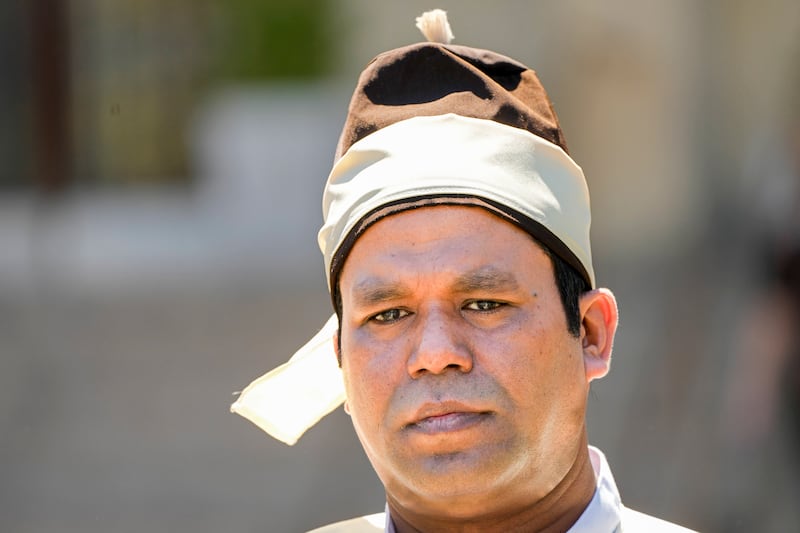Recent alleged attacks against the Rohingya in western Myanmar are “worse than in 2017,” when hundreds of thousands of the Muslim minority fled to neighboring Bangladesh, and represent a “second wave of genocide,” two experts said in a press briefing Thursday.
The United States in 2022 said that attacks by Myanmar's military against Rohingya civilians in 2017 were a " genocide," but violent attacks have continued as the country's military junta and the rebel Arakan Army battle for control of key cities in Rakhine state.
Related stories
[ Rohingya at risk of being forgotten, activists sayOpens in new window ]
[ Arakan Army treatment of Rohingya minority poses challenge to Myanmar oppositionOpens in new window ]
[ Rebels evacuate 13,000 Rohingya amid battle for Myanmar’s MaungdawOpens in new window ]
The Arakan Army this week evacuated 13,000 Rohingya from one town, Maungdaw, after claiming control of a majority of it in battles that form part of a wider civil war in Myanmar. About 1 million Rohingya already live in prison-like refugee camps in Bangladesh.
At a briefing held by the Simon-Skjodt Center for the Prevention of Genocide at the U.S. Holocaust Memorial Museum in Washington, Wai Wai Nu, the director of the Women’s Peace Network in Myanmar, said the number of Rohingya in Myanmar was steadily dwindling.
“Many of my relatives and colleagues and friends in Rakhine state are saying that this is worse than in 2017 and they think this is the second wave of genocide, probably in a more horrific way,” Wai Wai Nu said, adding that Rohingya were being erased from Myanmar.
The towns of Maungdaw and nearby Buthidaung, she said, were the two centers of Rohingya life in Myanmar with the highest population of the minority as well as the centers of their culture and history.
Even after 90% of the Rohingya population in the two towns fled to internal displacement camps in Myanmar or into Bangladesh following the 2017 attacks, Wai Wai Nu said, the towns remained majority Rohingya areas. But both were now devoid of any Rohingya.
“These are very important cities for the Rohingya population,” she said. “If we are rooted out from here, it means our existence in Burma is at threat – not only physical existence, but our historical existence.”
Claims against Arakan Army
Naomi Kikoler, the director of the Simon-Skjodt Center for the Prevention of Genocide, told the briefing that the Rohingya's plight had repeatedly been forgotten amid the wider situation in Myanmar.
“There has been a historic failure to prioritize looking at the unique risks that the Rohingya community faces,” Kikoler said, calling for a “fundamental change” in the world’s approach to their situation.

She said the West had at times – in particular before the 2021 coup – displayed “a reluctance to look at the community, because the dire conditions that they were in undermined the narrative of success and the narrative that Burma was on the road towards democracy.”
There was now a risk that the Rohingya were again being deprioritized due to the successes of rebels in Rakhine state, she said.
Tun Khin, president of the Burmese Rohingya Organization UK, said that was exactly what was occurring, with the Arakan Army's recent victories against the junta shrouding its treatment of Rohingya.
“We are together with everyone in Burma to get rid of Burmese military, but they cannot build their revolution and their independence under the blood of the Rohingya,” Tun Khin said, accusing the Arakan Army of waging a simultaneous war to drive the Rohingya out of Rakhine.
“They are fighting against the Burmese military. But they cannot wipe out another population and then just build up Rakhine state,” he said.

Several Rohingya in Rakhine state have told Radio Free Asia that the Arakan Army was responsible for attacks that left dozens of them dead. But the group this week denied responsibility for any attacks.
Yet the denials have left many Rohingya unconvinced.
Wai Wai Nu said the Arakan Army often seemed no more interested in maintaining a Rohingya presence in Myanmar than the military junta.
“Traditionally, these communities in Rakhine state – both Arakan and Rohingya – have grievances, and Arakan see Rohingya as the second enemy after the ethnic Burmese,” Wai Wai Nu said, describing Arakan Army’s attacks against Rohingya as “systematic and deliberate.”
“What we're seeing today is that they have actually learned a lot from the Burmese military’s genocide against the Rohingya,” she said, “and they have learned many other tactics from the Burmese military.”
Radio Free Asia, a news organization affiliated with BenarNews, produced this report.
